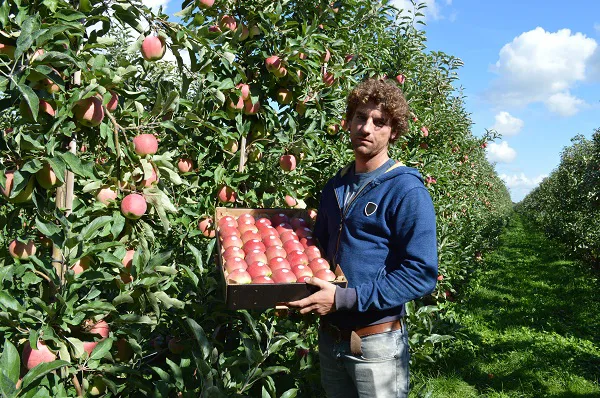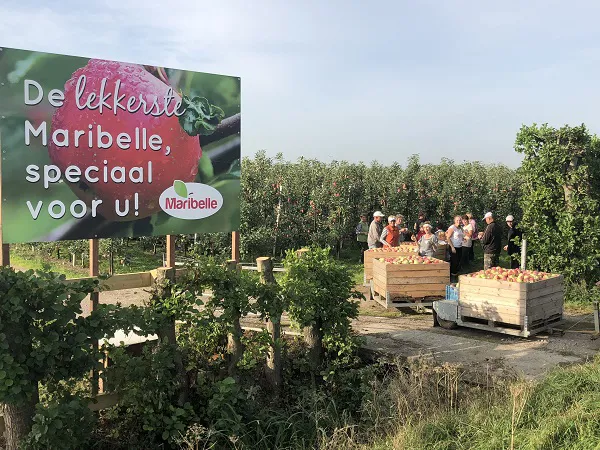"Only considering costs doesn’t get you anywhere" is how René Wellner of Roel Wellner Fruit – a Dutch company that grows products like Maribelle apples and markets those and those from other growers – summarizes his view of the current apple market. "We'll have to find a middle ground to survive this winter, and hopefully, certain lines will stabilize again. Because energy prices, as they are now, make cultivation unsustainable," he begins.

René and his brother, Jeroen, run the company. They cite rising prices for things like energy, labor, and crop protection products as the main current challenges in apple farming. René says much depends on available choices. "A business that sells off-tree or doesn't own crates has fewer options. They could decide to sometimes leave smaller fruit hanging on the trees. We do everything in-house, from start to finish, giving us more choices. Still, we face a challenging winter. Prices will need to be seriously good to cover costs." Still, he remains realistic: "You won't be able to recoup all your costs; that's impossible."
Broad sales
That is why the fruit grower emphasizes the importance of broad sales opportunities for all quality grades. "Maribelle apples fare well in both marketing and processing. They’re in demand in the juicing as well as processing industries. But, they do well in the middle and premier segments too," says René. He says marketing a crop's lower quality classes is just as important as that of the Class I fruit. "It's worth far more to cover the yield's lower end, at least as much as marketing the top well. These apples must have value across the board." Roel Wellner Fruit thus sell its Maribelle apples in various channels, René explains: from market vendors to greengrocers and wholesalers to retailers.
He also considers it critical to have clear communication and sales lines." If we all only do sales, it leads to nothing. Send the product via a single line, and all the links are secure. You become known, and the supply goes where it must. Then you get the best prices, which benefits growers, packers, and traders alike," says Wellner.

"That also benefits clients, who then don't have to face competition from fellow buyers who may be offering the same apple for less. Then everyone gets a fair price, while Maribelles get sold for the same price as those facing stiff competition. With Maribelle, we strive for continuity, fixed prices, and fixed lines. That offers security and is efficient; I consider that the future." And, though he supports concept varieties, René feels too many are entering the market. "Then you may not be competing with the same variety, but you are with the same concept," he admits.
Own social media team
Yet, René is optimistic about the Maribelle's prospects. He gathers that sales channels are becoming increasingly familiar with this variety. Thanks to its own social media team, consumers are now included in the Maribelle story with its "friendly, flexible, and tempting" slogan. The growing demand for Maribelle - which meets consumer demand for a refreshing, long-lasting apple - means its acreage can expand. In the Netherlands, regular growers, who collectively cultivate Maribelle apples on some 90 hectares, are especially keen to expand that area, but new growers are also joining. "Customers want more Maribelle apples. Growers are replanting and buyer turnover is increasing, so demand's on track."
Stable demand
René expects demand to remain stable but believes market conditions will lead to ever-shortening lines between cultivation and buyers. "You'll have to remove links to save costs. We're ready for that: we grow, sort, package, and market. We've spent money on becoming independent.” Demand-wise, René expects that when there's inflation and pressure on consumer spending, apples can do particularly well. "Apples are included in products perhaps least affected by inflation. They're stable and regional. Plus, they're super healthy and offer countless processing possibilities. Apples will, undoubtedly, remain in demand," he concludes.
René Wellner Roel Wellner Fruit
Roel Wellner Fruit
Esterweg 12 A
4185 NN Est
+31 (0) 6 55175169
[email protected]
www.maribelle-appel.nl
